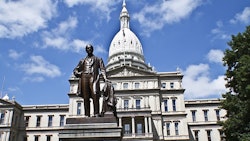
Looking ahead to the 2018 midterm elections, the U.S. political scene has never played host to so many public debates about cannabis reform. Four states will put legalization issues before voters—Michigan, North Dakota, Missouri (medical) and Utah (medical)—and candidates in plenty of other races are distinguishing themselves from one another by their policy stances on cannabis.
Though the election isn’t until Nov. 6, it’s never too early to break down the importance of certain campaigns and the implications of political races.
With a busy primary season in the rearview, 2018 is already the busiest political year in U.S. cannabis history. No doubt, the momentum in this upcoming midterm will influence the direction of cannabis reform as we head quickly toward 2020.
Michigan legalization
Michigan may be the first state to bring an adult-use cannabis market to the Great Lakes region and, more broadly, to the Midwest.
According to a September ClickOnDetroit poll, the legalization initiative is supported among the majority of Michigan voters, 56 percent to 38 percent.
Michigan voters approved a loosely regulated medical marijuana law in 2008. In recent years, the state has gone to great lengths to tighten its oversight—combing through business applications under restrictive timelines.
Michigan governor
Michigan’s cannabis issue will come before voters in tandem with a competitive gubernatorial race. Gov. Rick Snyder is term-limited, so we turn to Democratic candidate Gretchen Whitmer and Republican candidate Bill Schuette.
Whitmer has vocally supported the legalization initiative and discussed her plans for overseeing a proper and equitable roll-out of any regulatory legislation. Schuette, the state’s attorney general, has opposed past cannabis reform efforts in Michigan and has said that he will vote against the adult-use issue in November. This summer, his campaign spokesperson told the Detroit Journalism Cooperative, “Bill does not personally support legalizing recreational marijuana but as governor he will respect the will of the voters.”
North Dakota legalization
North Dakota voters will decide whether to set up an adult-use cannabis market for its population of fewer than 1 million. If passed, this would be the quickest that a state has jumped from medical marijuana approval to adult-use approval. (North Dakota voters approved a medical marijuana law in 2016.)
The ballot measure is also unique in that it preemptively includes a set of social equity and criminal justice clauses. Legalize ND chairman David Owen told Cannabis Business Times that the bill skips past any need for state legislature input on cannabis conviction expungement policies, and rather includes a directive to seal all past records of cannabis-related crimes—with a few caveats.
A recent Polco poll, shared by the Bismarck Tribune, places support for the adult-use measure at 82.4 percent in North Dakota.
Missouri medical (three issues)
Missouri is, without doubt, host to the most active cannabis legalization season in the U.S. right now. Voters in the Show-Me State will be shown three separate medical cannabis ballot issues in November.
Let’s do the numbers.
New Approach is behind one of the two constitutional amendments on the ballot. This amendment would allow patients to grow their own plants at a state-licensed facility. Cannabis products would see a four-percent sales tax.
The Bradshaw Amendment, funded and supported by Springfield, Mo., physician Brad Bradshaw, would set up a state research institute and a research board helmed by Bradshaw. The idea behind the research institute, according to Bradshaw, is to put research in a priority position in the cannabis marketplace. “If we’re going to find a cure for cancer, we can’t continue to do what we’ve done. We're not going to find a cure at this rate," he told the Riverfront Times. "We need to bring together the best and the brightest, similar to the Manhattan Project, the Apollo moon mission.” Under this constitutional amendment, cannabis products would see a 15-percent sales tax.
The Missourians for Patient Care Act would create a new state law (rather than a constitutional amendment) that would give state legislators room to massage its regulatory language in the event that voters approve it. Under this petition language, cannabis products would see a two-percent sales tax.
It’s entirely possible that more than one of these ballot measures will be approved by voters. Between the two constitutional amendments, the one with the higher “yes” votes would supersede the other. But if the Missourians for Patient Care Act passes, there will surely be a public debate over how to grasp the will of the people.
Utah medical
Utah’s medical cannabis campaign is heavily supported by the Marijuana Policy Project and heavily opposed by the Church of Jesus Christ of Latter-Day Saints. With battle lines drawn clearly across the social landscape in mostly conservative Utah, it’s been an event campaign to watch.
Nonetheless, Gov. Gary Herbert has said that he’ll push the state legislature to draft “a bill that everybody can support” in the event that this ballot issue fails in November.
According to UtahPolicy.com, 64 percent of likely voters are in support of Proposition 2.
Wisconsin voter questions
While non-binding voter questions don’t mean much in the legal sense, the types of voter referendums that will appear in counties across Wisconsin this November will surely push the public discourse in the general direction of legalization.
Wisconsin’s CBD-only law protects patients in possession of CBD oil—but it does not allow the production or distribution of CBD oil. The questions before voters in November will gauge public support for a broader medical marijuana law, of the sort seen in neighboring Minnesota, Illinois or Michigan.
Texas U.S. senator
The prevailing narrative across the American political landscape in 2018 is whether the House or Senate will flip to Democratic control. This would inevitably open the floor to more open cannabis reform debates (Democrats being generally more supportive of legalization and social-equity legislation, even though cannabis issues tend to unite both major parties to some degree).
Rather than zoom in on every U.S. House and Senate race, the campaign in Texas is worth a close look. Incumbent Ted Cruz is facing challenger Beto O’Rourke.
According to the Texas Tribune, cannabis (and drug policy in general) has become a major point of contention between the two candidates. Cruz has opposed cannabis legalization, though, as a federal legislator, he’s spoken about the need to preserve states’ rights in this issue. He’s worked to draw O’Rourke’s cannabis stance into the spotlight and to insist that liberal policies have no place among the Texas electorate. O’Rourke, however, has campaigned for years on decriminalization and legalization fronts. (O’Rourke first won his seat at U.S. House Rep in Texas’ 16th District in 2012.)
NORML endorsed O’Rourke’s campaign earlier this year; “Beto has been a true champion for abolishing our disastrous prohibition on marijuana since the very beginning of his political career as a city council member in El Paso. We were pleased to support him in his previous campaign for the House of Representatives and excited to endorse him again in his race for the US Senate,” said NORML PAC Executive Director Erik Altieri.
This Senate race is a clear example of how cannabis reform is becoming a major force in political momentum.
Top photo courtesy of Adobe Stock


























